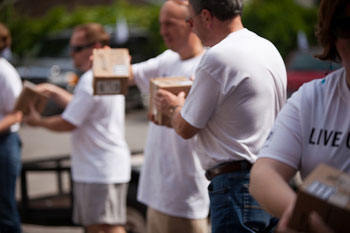Give to United Way of Metropolitan Nashville and help St. Luke’s Community House’s Restore the Dream center continue to help Nashvillians recover from the flood

Denice O’Neill was scheduled to return to Nashville from a business trip on May 2, 2010. “Of course, that didn’t happen,” she said. It had rained more than 13 inches in two days in Nashville, and much of the city was underwater. When O’Neill finally was able to return home, she got a bird’s eye view of the damage from her airplane window and knew she had to get involved.
A one-time president of the U.S. Junior Chamber, she had coordinated disaster relief twice before – in Louisiana after Hurricane Katrina and in Iowa after the floods of 2008. When she heard that St. Luke’s Community House needed a director for its Restore the Dream center, O’Neill took on the challenge.
Restore the Dream began as a network of local relief agencies brought together by United Way of Metropolitan Nashville to provide ongoing assistance for residents affected by the floods. The planning began in the first days of the disaster. United Way officials contacted their counterparts in New Orleans and South Florida, who told them that as important as emergency relief was, the real key to recovery was comprehensive long-term case management.
Gifts can be made to this and other community agencies through Dec. 31, 2011.
“They were brilliant,” O’Neill said. “[rquote]Instead of just reacting and throwing money at the situation, they took a step back and said, ‘What do we need to do for the long haul for people to recover? How can we utilize the money from donors in the most efficient and effective way?’”[/rquote]
Using information gathered from the 2-1-1 Helpline and from Metro government, United Way was able to map out the five hardest-hit neighborhoods and coordinate assistance with nonprofits already serving those areas, including St. Luke’s.
St. Luke’s is a United Way Family Resource Center, providing a wide array of programs to the West Nashville community, including child care, health screenings and tax preparation. Restore the Dream partners would need to take the same comprehensive approach to efficiently meet the diverse needs of people who had lost so much.
Restore the Dream case managers helped clients coordinate multiple services, including navigating the FEMA application and appeal process, arranging temporary housing and rental assistance, and organizing contractors, donations and volunteers. The centers worked closely together, pooling their resources to provide equality of service to each neighborhood and using their bargaining power to negotiate needed items at a lower price.
“Instead of each center trying to buy 10 or 15 water heaters, we could say we needed 100,” O’Neill said, “and that brought the cost down for everyone.”

In the year and a half since the flood, Restore the Dream has assisted more than 1,240 households – about 75 percent of the residents identified by the Davidson County Long Term Recovery Committee as being in need of long-term case management.
This summer, the partners of Restore the Dream determined that they could begin to wind down their operations. No one would be cut off, but all the remaining open cases were transferred to St. Luke’s, which continues to serve them.
United Way provided funding and publicity for the program, but more importantly, it was United Way’s ability to identify and connect organizations to needs that made Restore the Dream possible in the first place.
“This is what United Way does,” said Phil Orr, senior vice president of community impact at United Way of Metropolitan Nashville. “We bring together parties to collectively solve deep social issues.”
St. Luke’s Community House is one of many agencies comprising United Way of Metropolitan Nashville. You may designate St. Luke’s or any United Way member organization when you give to the community through Vanderbilt Gives.
“My friends in Iowa say Nashville is actually ahead in terms of recovery,” even though Iowa’s floods occurred two years before Nashville’s, O’Neill said. She attributed the speed of progress to Nashville’s resilience and community involvement. “People really care about their neighbors here.”